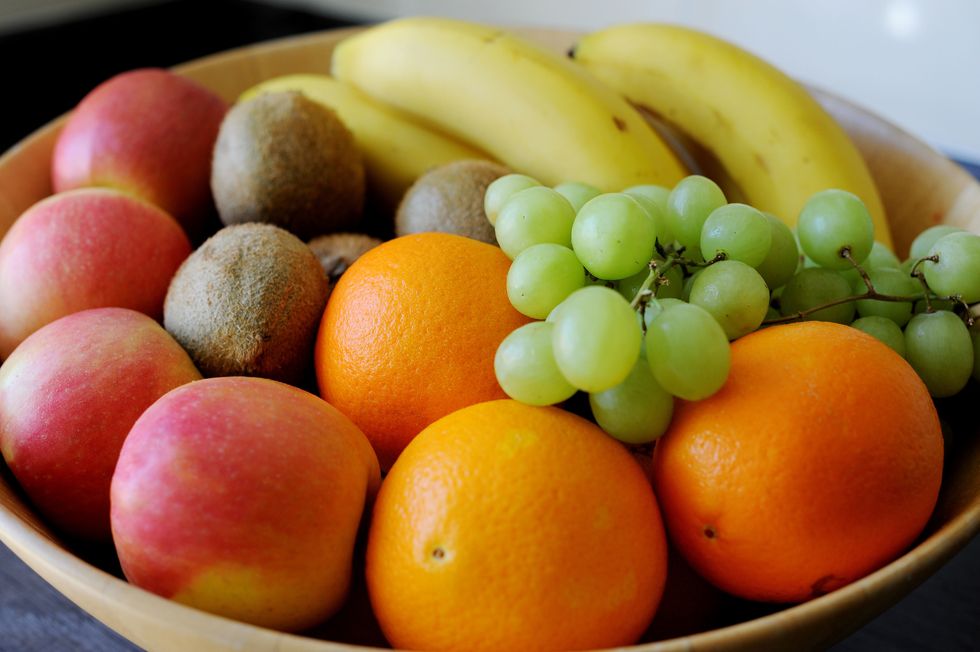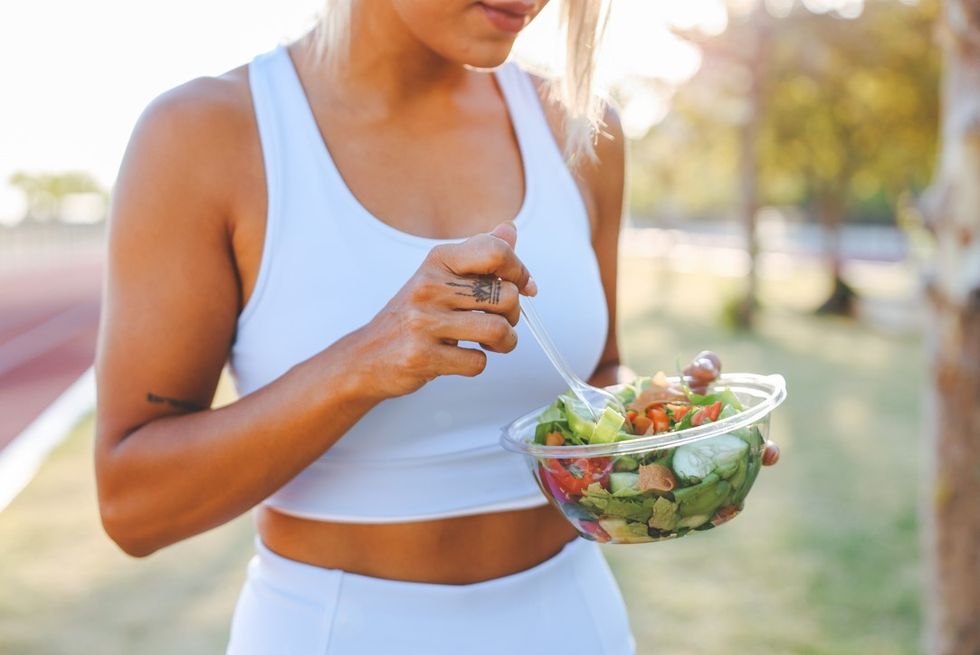Experts have shared a seven day plan to help promote weight loss and improve health
Don't Miss
Most Read
Trending on GB News
Nutrition experts have shared the best foods to eat to slim down and get some great health benefits.
They shared a diet plan based on the popular Mediterranean diet.
The Mediterranean diet is often praised as one of the healthiest ways to eat.
It involves eating whole foods such as fruits, vegetables, beans, nuts, seeds and whole grains.

The Mediterranean diet involves eating lots of fruits and vegetables
PA
Those following the plan can also tuck into lean protein such as chicken, eggs and fish and dairy like milk and yoghurts all in moderation.
A nutritionist at Total Shape shared some of the benefits of following the plan, including weight loss.
They said: “Research found that the Mediterranean diet supports prevention of cardiovascular diseases, increases lifespan, and healthy ageing.
"Also, when used in conjunction with caloric restriction, the diet may also support healthy weight loss.”
If trying to lose weight, slimmers can eat foods on the plan while cutting calories.
The expert shared a sample diet plan for one week as well as the benefits of eating such foods.
Day 1
Breakfast: Greek yoghurt with berries and a sprinkle of nuts
Experts said: “Greek yoghurt provides protein and probiotics, while berries and nuts add antioxidants and healthy fats.
“For those trying to lose weight, opt for Greek yoghurt low in added sugars.”
Lunch: Greek salad with feta cheese, olives, and grilled chicken
“Greek salad is rich in vitamins, minerals, and fibre from fresh vegetables, and grilled chicken adds lean protein- which is essential for bodily functions.
“For flavour, add as many herbs or dressing as you desire, but be careful of dressing that are high in fat and sugar. If your goal is to lose weight, keep the added sugars and saturated fats low.”
Dinner: Baked salmon with lemon and herbs, served with roasted vegetables
“Baked salmon is an excellent source of omega-3 fatty acids, and roasted vegetables provide essential nutrients.
“Consuming foods high in omega-3 can help reduce inflammation in the liver, and ward off the damage fat in the liver can cause.
“Vegetables are high in vitamin C, vitamin A, potassium, and folate. These nutrients are essential for various bodily functions, including immune support, vision, and heart health.”
Day 2
Breakfast: Whole grain toast with avocado and sliced tomatoes
Experts said: “Whole grain toast adds fibre and energy to your morning, whilst avocado is rich in healthy fats, and essential nutrients, including vitamin K, vitamin E, vitamin C, and various B vitamins, and minerals such as potassium and magnesium.”
Lunch: Mediterranean quinoa salad with cucumbers, tomatoes, and feta cheese
“Quinoa is a complete protein, combined with Mediterranean flavours from cucumbers, tomatoes, and feta cheese, providing make it delicious and nutritious.
“Additional benefits from cucumber and tomatoes include hydration, where cucumbers are composed of about 95 per cent water, and their low-calorie content, making them a great addition to salads for those looking to manage their calorie intake."
Dinner: Grilled chicken kebabs with bell peppers and onions, served with a side of hummus
“Grilled chicken is a lean source of protein, essential for muscle growth and repair, whilst bell peppers and onions provide an array of vitamins and minerals, including vitamin C, vitamin A, and dietary fibre.
“Hummus contains healthy fats, primarily from tahini (sesame seed paste), which provides monounsaturated and polyunsaturated fats that are good for heart health.”
Day 3
Breakfast: Oats topped with fresh fruits and a drizzle of honey
“Oats are a great source of fibre, helping steady bowel movement.
“For those who have a busy workday or perhaps training at the gym, oatmeal is also great for energy levels. This is because it is a complex carbohydrate that provides a steady release of energy, helping to stabilise blood sugar levels and prevent energy crashes.
“Honey contains a variety of antioxidants, including flavonoids and polyphenols, which help combat oxidative stress in the body.”
Lunch: Caprese salad with mozzarella cheese, tomatoes, and basil
“Caprese salad combines the goodness of mozzarella cheese, tomatoes, and basil, offering calcium, antioxidants, and flavour. Mozzarella cheese is a good source of high-quality protein.”
Dinner: Whole wheat pasta with grilled prawns, cherry tomatoes and spinach
“Whole wheat pasta provides complex carbohydrates, whilst grilled prawns add lean protein.
“Spinach is classed as a superfood, containing vitamins and minerals such as vitamin A, vitamin C, vitamin K, folate, iron, calcium, potassium, and magnesium.”

Experts share a healthy diet plan
GETTY
Day 4
Breakfast: Veggie omelette with spinach, tomatoes, and feta cheese
“A veggie omelette is packed with protein and vitamins from spinach, tomatoes, and feta cheese," experts said.
“If prepared without excessive amounts of added fats or cheeses, veggie omelettes can be a relatively low-calorie meal option, making them suitable for those looking to manage their calorie intake.”
Lunch: Greek-style grilled chicken wrap with tzatziki sauce and mixed greens
“With chicken providing protein and greens for vitamins, the tzatziki provides the Mediterranean element. Typically made with yoghurt, which contains probiotics, this bacteria will help to promote gut health.
“Consuming probiotics can help maintain a healthy balance of gut microorganisms, aiding in digestion and potentially boosting the immune system.”
Dinner: Baked cod with a Mediterranean tomato sauce, served with quinoa and steamed asparagus
“Baked cod is a lean source of protein, and the Mediterranean tomato sauce adds flavour and antioxidants.
“Cod is also a good source of essential nutrients such as vitamin B12, vitamin B6, niacin, phosphorus, and selenium, all of which play important roles in overall.”
Day 5
Breakfast: Greek yoghurt with honey and sliced almonds
“Greek yoghurt provides protein and calcium, whilst honey and almonds offer natural sweetness and healthy fats," experts explained.
“Almonds are particularly rich in monounsaturated fats, which are heart-healthy fats that can help reduce the risk of heart disease by lowering levels of LDL (bad) cholesterol.”
Lunch: Mediterranean chickpea salad with cucumbers, tomatoes and olives
“Chickpea salad combines fibre-rich chickpeas, fresh vegetables and olives, offering a satisfying and nutritious meal.
"Olives are particularly a staple in Mediterranean cuisine and offer various health benefits.
“Olives are rich in antioxidants, including vitamin E and various phytonutrients, helping to protect cells from oxidative damage.”
Dinner: Grilled lamb chops with a side of roasted potatoes and a Greek salad
Experts said: “Lamb is particularly rich in iron, while a Greek salad adds freshness and vitamins.
“Lamb is great when consumed in moderation as part of a balanced diet. The red meat is rich in heme iron, which is more easily absorbed by the body compared to non-heme iron found in plant-based foods.
“Iron is crucial for oxygen transport in the blood and preventing iron-deficiency anaemia.”
Day 6
Breakfast: Whole grain toast topped with almond butter and banana slices
“Almond butter is a good source of plant-based protein, whilst retaining protein content.
“Bananas are an excellent, natural source of carbohydrates, including sugars (such as glucose, fructose, and sucrose), making them a quick and convenient energy source. They are often consumed by athletes before or after workouts to replenish energy stores.”
Lunch: Mediterranean tuna salad with white beans, red onions, and lemon dressing
“Tuna is a good source of omega-3 fatty acids and high-quality protein.
“Whilst white beans aren’t only a good source of protein, but they also provide complex carbohydrates that are slowly digested, leading to gradual increases in blood sugar levels and sustained energy. This makes them suitable for individuals with diabetes or those seeking steady energy levels.
“Red onions are rich in antioxidants and are anti-inflammatory. Lemon dressing is relatively low in calories, making it a healthier option for adding flavour to salads and dishes without significantly increasing your calorie intake.”
Dinner: Aubergine Parmesan served with a side of mixed greens
“Aubergine Parmesan is a delicious vegetarian option, which is a good source of dietary fibre, promoting digestion, helps regulate blood sugar levels, and helps you to feel full.”
Day 7
Breakfast: Spinach and feta cheese omelette with whole wheat toast
“Spinach and feta cheese omelette provides protein, iron, and calcium, and whole wheat toast adds fibre.”
Lunch: Mediterranean stuffed peppers with quinoa, tomatoes and feta cheese
“An extremely popular lunch, peppers, quinoa, tomatoes, and feta cheese, offer a balanced meal with vitamins, minerals, and protein.”
Dinner: Grilled vegetable skewers with a side of couscous and a Greek salad
“A great vegetarian option, you can opt for any vegetables you desire.
“A Greek salad is a classic Mediterranean dish made with fresh vegetables, feta cheese, olives, and a simple dressing which is normally olive oil and lemon juice or vinegar.
“Incorporating extra-virgin olive oil in the dressing will provide monounsaturated fats, which are considered heart-healthy fats.”









